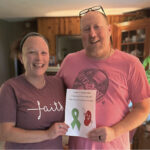Nearly half of all Americans are obese, and the population of severely obese people has nearly doubled in the last two decades, according to the Centers for Disease Control and Prevention (CDC).
With the added weight comes an added risk for heart disease, stroke, diabetes, and certain cancers, and adds hundreds of billions of dollars in costs stemming from those conditions, the CDC says.
While many turn to fad diets that rely on vilifying and eliminating certain foods, a different approach, intuitive eating, is taking hold.
That approach focuses less on what we eat and more on why we eat, and the concept is getting attention from folks like Kaitlyn Miele and Debra Garzon, registered dietitians with Capital Blue Cross’ Health Promotion and Wellness team.
Introduced in 1995 by dietitians and authors Evelyn Tribole and Elyse Resch, intuitive eating is known to some as the anti-diet. It revolves around 10 principles designed to help people become mindful and self-aware while eating:
- Reject the diet mentality.
- Honor your hunger.
- Make peace with food.
- Challenge the food police.
- Respect your fullness.
- Discover the satisfaction factor.
- Honor your feelings.
- Respect your body.
- Movement—feel the difference.
- Honor your health with gentle nutrition.
Restricting foods, especially ones you enjoy, can increase cravings for those foods, according to Miele. “Deprivation can lead to a binge-and-restrict cycle known as yo-yo dieting. Intuitive eaters are governed by internal cues rather than external diet plan rules,” she explained.
“Obesity is not always just about calories in and calories out,” Miele said. “That is oversimplifying a complex issue. … Many other factors can contribute to weight gain and obesity. It is not just a matter of will power or laziness. That, unfortunately, seems to be the stigma.”
Garzon, a registered dietitian with more than 20 years of experience, began her intuitive eating journey about nine years ago. She took a continuing education course that included an exercise in which students were asked to eat lunch in silence while being mindful of how they felt during the meal.
“It was an eye-opening experience even for a seasoned dietitian,” Garzon said. “I was astounded that during this exercise I was only able to get through half of my meal – a sandwich, fruit, pretzels, and water – when I realized I was so full I did not want to take another bite. This was the beginning of a wonderful journey to better health.”
Garzon started slowly by practicing intuitive eating during just one meal a day.
“It was difficult at first with family schedules, kids, sports, and working full time,” she said. Soon enough, she was practicing mindful and intuitive eating at every meal and, as a result, eating less.
In just a couple of months, she lost some weight, her clothes fit easier, she was sleeping better at night, and she was feeling more confident overall during the day.
“I really started to see how simply slowing down with eating a meal, being self-aware, and respecting my body’s hunger and fullness responses was changing my entire outlook on food and healthier eating overall,” she said.
“It doesn’t cost anything,” Garzon said. “There are no special meals and no calorie counting. It is simply a mindset adjustment and a path on a healthy lifestyle journey.”
For more health and wellness news and information that can benefit your business and employees, visit thinkcapitalbluecross.com.
If you like what we do, please support our work. Become a Friend of TheBurg!






